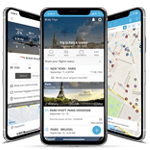Awarded Best Travel Software Company 2019
Africa
Caribbean
- Antigua & Barbuda
- Anguilla
- Aruba
- Barbados
- Saint Barthelemy
- Bermuda
- Bonaire St Eustatius
- Bahamas
- Curaçao
- Dominica
- Dominican Republic
- Grenada
- Guadeloupe
- Jamaica
- Saint Kitts and Nevis
- Cayman Islands
- Saint Lucia
- Saint Martin
- Martinique
- Puerto Rico
- Sint Maarten
- Turks & Caicos Islands
- Trinidad and Tobago
- Saint Vincent & Grenadines
- U.K. Virgin Islands
- U.S. Virgin Islands
Middle East
Europe
- Andorra
- Albania
- Armenia
- Austria
- Azerbaijan
- Bosnia and Herzegovina
- Belgium
- Bulgaria
- Belarus
- Switzerland
- Cyprus
- Czech Republic
- Germany
- Denmark
- Estonia
- Spain
- Finland
- Faroe Islands
- France
- United Kingdom
- Georgia
- Gibraltar
- Greenland
- Greece
- Croatia
- Hungary
- Ireland
- Iceland
- Italy
- Liechtenstein
- Lithuania
- Luxembourg
- Latvia
- Monaco
- Moldova
- Montenegro
- Macedonia
- Malta
- Netherlands
- Norway
- Poland
- Portugal
- Romania
- Serbia
- Russia
- Sweden
- Slovenia
- Slovakia
- San Marino
- Turkey
- Ukraine
- Kosovo
- Georgia

Travel Data Integration
Maximizing Business Efficiency with Travel Data Integration
Trusted by World’s Leading Travel Brands
Travel Data Integration - Unlocking Valuable Insights To Enhance Customer Experiences and Streamline Operations
Advance your platform with real-time travel data, simplify bookings, and improve your travel services with Travel Data Integration.
What is meant by Travel Data Integration?

Travel data integration is the process of integrating and syncing data from numerous travel industry sources, such as airlines, hotels, car rentals, booking platforms, and consumer databases, into a single system. The travel business is frequently dispersed, with each business maintaining its data, making it challenging to manage operations efficiently. Integrating this data allows companies to streamline procedures, reduce errors, and guarantee accurate, real-time information across all platforms.
Furthermore, integrating data allows companies to make more informed, data-driven decisions. They can track booking patterns, assess client preferences, and optimize pricing strategies in real-time, resulting in higher revenue and lower operating costs.
Airlines, for example, can utilize integrated data to provide personalized offers based on a customer's previous travel history, whereas hotels can dynamically customize rates based on real-time demand. This increases operating efficiency, reduces redundancy, and enables better decision-making.
For example, when a consumer books a flight, the information must be synced with hotel reservations, car rentals, and tour bookings. Data integration ensures that updates across all systems occur seamlessly, reducing errors such as double bookings, missed reservations, and outdated travel information. This unified solution not only reduces administrative costs by automating tasks and eliminating redundancies, but it also enhances operational efficiency.
Furthermore, travel data API provides travel organizations with a 360-degree perspective of client activity, which can be utilized for advanced analytics and tailored services, increasing customer loyalty and satisfaction.
Overall, the ability to consolidate and synchronize travel data enables companies not only to increase their operational efficiency but also enhance the overall customer experience by offering seamless, accurate, and timely services.
What is the role of data integration in travel technology?

Data analytics play a huge role in the highly competitive travel industry. To enhance their operations, travel companies use significant data such as passenger preferences, booking patterns, and more. Big data can forecast and deliver exactly what the client needs while also identifying possibilities for improvement.
XML Data API Integration in travel technology combines data from a range of sources, including booking systems, customer databases, and supplier information, to create a single view of travel information. The incorporation enhances decision-making by providing accurate, real-time insights that help travel companies make informed choices on pricing, demand forecasting, and customer experiences.
It also increases operational productivity by automating operations, minimizing manual data entry, and syncing information across several platforms to ensure seamless communication.
With integrated data, travel companies can streamline processes, reduce errors, and increase coordination, resulting in higher client service and satisfaction.
Travel data analytics plays a pivotal role in several key areas of the business travel industry:
- Personalized Travel Experiences: By evaluating customer data, companies can offer personalized recommendations for travelers.
- Pricing Strategies: Dynamic pricing models that adjust prices based on demand, seasonality, and competitive landscape are driven by data analytics.
- Operational Efficiency: Airlines and hotels use data analysis to enhance route planning, inventory management, and resource allocation.
- Customer Service: Predictive analytics enables you to predict and manage customer service issues before they arise.
- Demand Forecasting: Travel data analytics can assist businesses estimate future travel demand, allowing them to adjust price, inventory, and resources accordingly.
- Risk Management: Analyzing historical data on travel patterns, weather conditions, geopolitical events, and other factors allows businesses to analyze and minimize risks.
- Competitive Intelligence: Travel organizations get insight into their competitive environment by analyzing market trends and competitor's strategies.
- Fraud Detection: Data analytics helps detect and prevent activities like credit card fraud, identity theft, and ticket scalping.
Why XML Data API Integration matter to your travel business?
In the rapidly evolving travel industry, XML Data API Integration has become a crucial component for businesses looking to enhance operational efficiency and customer satisfaction. Travel data analytics in the business travel market revolutionizes how businesses manage travel expenses, enhance passenger experiences, and increase operational efficiency.
Implementing a robust travel data API strategy is essential for travel businesses looking to stay ahead in a competitive industry. By leveraging advanced technologies and best practices, companies can unlock the full potential of their data, driving innovation and growth. As the travel industry evolves, companies that engage in data integration will be well-positioned to capitalize on new possibilities and trends.
This holistic approach helps in identifying trends, increasing efficiency, and providing personalized experiences to customers, ultimately leading to higher customer satisfaction and business growth.
By seamlessly connecting diverse data sources, travel companies can gain complete insights, streamline procedures, and provide tailored customer experiences. This not only enhances decision-making but also provides an edge in a dynamic market.
Companies that consolidate all travel data can simply analyze expenses, manage budgets, get real-time information, and increase customer satisfaction. It also streamlines reporting and data analysis, allowing better planning and forecasting.
Travelers benefit from integrated data as it provides them with immediate alerts on schedule changes, tailored travel recommendations, and faster responses to inquiries. This synchronization results in a more seamless and pleasant travel experience.
What Travel Data Integration Involves:
- Connecting Different Systems: Travel businesses frequently utilize a variety of systems to perform various functions, such as booking engines, customer relationship management (CRM) tools, inventory management, payment gateways, and communication platforms. Travel data integration allows real-time communication between various systems, allowing data to flow easily between platforms. For example, when a consumer books a flight through a travel agency's website, the booking system must instantly interact with the airline's database to confirm availability and pricing.
- Real-time Data Synchronization: A key component of travel data integration is the ability to synchronize data in real-time. For example, when a consumer books a hotel room or a flight, the availability and pricing information must be updated instantly across all systems to avoid doubles bookings, outdated pricing, or inaccurate information. Real-time updates guarantee that clients get the most precise and up-to-date data when making travel selections.
- Centralized Data Hub: Data integration frequently involves setting up a centralized hub where all travel-related information is stored and acquired. This centralized system can collect data from several sources (such as hotel booking platforms, flight booking systems, and car rental systems) and deliver it in an organized manner. This is especially useful for travel companies and OTAs (Online Travel companies) that must manage enormous amounts of reservations and data from multiple suppliers and sources.
- Integration with Third-Party Suppliers: Travel companies frequently interact with various third-party suppliers, including airlines, hotel chains, car rental agencies, tour operators, and others. These suppliers typically have their systems for managing bookings and inventories. Integrating these third-party systems with the travel business's software facilitates booking and management. It additionally provides users access to real-time availability, price, and booking statuses, allowing businesses to provide clients with the most relevant options in real-time.
- APIs (Application Programming Interfaces): Many travel companies use API solution to combine data from external sources. APIs are technologies that enable numerous software systems to connect. For example, an OTA can utilize an API to get room availability and price from a hotel chain's reservation system. APIs are widely used to easily integrate third-party travel services like flights, hotels, and car rentals into a business's website or platform.
- Data Aggregation and Customization: Travel data integration involves combining data from numerous sources into a unified format. It can involve merging consumer profiles, booking histories, preferences, and feedback to provide tailored services. Travel companies can use integrated data to offer personalized travel packages, tailored recommendations, or exclusive deals based on customer preferences and past behaviors.
What types of data can be integrated in a travel business?

In a travel business, a wide range of data can be incorporated to create a unified and efficient system that enhances decision-making and operational performance. One of the most vital types of data is booking information, which includes details about flights, hotels, car rentals, and tours. By integrating this data across numerous platforms, travel businesses can manage reservations in real-time, eliminate duplicate bookings, and assure accurate availability.
Customer profiles are another important data type, that consists of personal details, travel preferences, past behavior, and loyalty information. Businesses that integrate client data can provide personalized experiences, such as tailored suggestions, targeted discounts, and customized trip packages, resulting in client satisfaction and loyalty.
Payment details are vital for completing transactions, and integrating this data guarantees secure, streamlined processing across various payment methods, preventing errors and delays.
Furthermore, inventory data—such as hotel availability, flight seats, car rental options, and tour slots—can be integrated to optimize resource management and pricing strategies. This allows businesses to dynamically adjust availability and pricing based on demand in real-time, increasing profitability.
Furthermore, marketing analytics give information on client engagement, campaign performance, and conversion rates. Companies that integrate this data with other business information can modify their marketing tactics, manage resources more efficiently, and make data-driven choices that increase client acquisition and retention.
Overall, integrating these diverse data types into a single system allows travel businesses to streamline operations, improve customer experiences, and make more informed, efficient decisions. It provides an in-depth overview of the business enabling better resource management, customized offerings, and more profitable results.
Challenges in Travel Business Data Integration
Data integration in the travel industry comes with several challenges due to an array of systems and formats used by different sectors like airlines, hotels, and travel agencies. These differences can make it difficult to achieve smooth data flow and synchronization. Inconsistent data standards and real-time updates can cause challenges, as timely information is vital for consumer satisfaction.
Another major concern is security and privacy, as travel companies manage sensitive customer data that must be compliant with regulations like GDPR and PCI DSS. Overcoming these challenges requires careful planning, the right tools, and ongoing monitoring to ensure successful integration.
Trawex offers automated integration tools that connect numerous travel platforms, ensuring accurate, real-time data transfers and maintaining high-security standards. This ensures that travel companies can focus on their core activities while retaining up-to-date and accurate data across all systems.
Ultimately, utilizing such API integration services simplifies, secures, and streamlines the process for both organizations and customers.
How can Trawex help with the integration of Travel Data API?
If you’re eager to leverage the power of data-driven insights for your travel businesses, contact Trawex. Our extensive range of competitive data solutions is designed to transform how you conduct trip planning.
With a commitment to excellence and innovation, Trawex allows businesses in the travel industry to stay ahead of the curve by utilizing cutting-edge technology and real-time data analytics.
Whether you’re seeking to optimize pricing strategies, increase traveler experiences, or navigate the dynamic landscape of travel technology trends, Trawex has the expertise to guide you toward success.
How Data Integration Optimizes Revenue across the Travel Industry?
Airlines
Airlines leverage data analytics to implement dynamic pricing and yield management tactics, that allow companies to adjust ticket rates based on demand, competition, and time of departure. This guarantees that ticket prices are optimized, increasing revenue per available seat.
Furthermore, by analyzing consumer data, airlines can categorize customers based on demographics, booking patterns, and loyalty, allowing them to provide targeted deals and upsell services like additional luggage or upgrades.
Data analytics also assists airlines in optimizing their flight routes and schedules by discovering profitable routes and displaying demand, resulting in more effective resource utilization and maximized occupancy.
Hotels
Hotels benefit from data analytics by optimizing room prices using dynamic pricing models that take into account local demand, surpass pricing and seasonal trends. This assures the highest occupancy and revenue per available room (RevPAR). Analytics also enables hotels to gain insight into consumer preferences, allowing businesses to personalize experiences and provide targeted promos to boost client satisfaction and loyalty.
Forecasting demand and booking trends allow hotels to plan for peak periods, customize pricing tactics, and reduce overbooking or underbooking. Furthermore, data-driven insights enable hotels to increase operational efficiency by optimizing workforce and inventory management, hence reducing operating expenses and increasing profit margins.
Online Travel Agencies (OTAs)
OTAs rely significantly on data analytics to analyze customer behavior, such as browser history, search patterns, and previous bookings. This data enables businesses to provide bespoke vacation packages, flights, hotels, and tours, resulting in higher conversion rates and client satisfaction. Dynamic pricing solutions enable OTAs to alter their prices in real-time based on demand, competition, and inventory, assuring optimum profitability.
Data analytics also assists OTAs with revenue forecasting by evaluating booking trends and seasonality, allowing them to optimize marketing efforts and offer discounts during off-peak times to maintain a consistent booking flow. Additionally, by evaluating supplier performance, OTAs can better manage relationships, adjusting commission rates and inventory strategies to maximize profit.
Cruise Lines
Cruise lines utilize data analytics to optimize pricing strategies by analyzing client demand, booking trends, and competitor pricing. This enables dynamic pricing, which increases occupancy rates and boosts revenue per passenger. Data analytics also allows cruise companies to segment their clients based on previous cruise choices and demographics, allowing them to provide personalized upselling possibilities such as excursions, luxury cabins, and onboard activities.
By analyzing previous reservations and seasonal trends, cruise companies can enhance itineraries and provide routes and locations that will appeal to more consumers. Furthermore, analytics enhances operational efficiency by displaying maintenance requirements, monitoring fuel usage, and optimizing workforce and supply chains, resulting in cost savings and higher revenue.
Tour Operators
Tour operators leverage data analytics to forecast demand for specific destinations or tour packages and adjust their offerings accordingly. Tour operators can create personalized itineraries and targeted marketing efforts based on consumer preferences and historical booking trends.
Data can additionally optimize price strategies by examining competitor's rates, booking trends, and seasonal fluctuations. This allows tour companies to remain competitive while increasing profits. Tour operators can enhance the whole customer experience by utilizing analytics to analyze client behavior and feedback, resulting in repeat bookings and higher customer loyalty.
Travel Management Companies (TMCs)
Travel Management Companies (TMCs) utilize data analytics to analyze corporate travel expenditure patterns and effectively manage travel budgets. This assists in discovering cost-cutting options, ensuring that employees follow business travel standards, and negotiating better terms with suppliers.
Data insights enable TMCs to provide personalized travel solutions to corporate clients, such as tailored itineraries and hotel options based on employee travel patterns. Furthermore, analytics enables TMCs to deliver accurate data and insights into travel trends, allowing businesses to make more informed decisions about their travel programs. TMCs can also utilize data to assess supplier performance, ensuring that their clients obtain the most competitive pricing and services.
Destination Management Companies (DMCs)
Data analytics helps Destination Management Companies (DMCs) discover the most profitable consumer categories and target them with targeted marketing strategies. Data enables DMCs to predict demand for certain tours, activities, and accommodations, allowing them to efficiently deploy resources during peak and off-peak periods.
Furthermore, by evaluating customer feedback and social media sentiment, DMCs can personalize their offerings to fit traveler expectations, thereby enhancing the customer experience. Analytics also allows DMCs to manage pricing strategies, resource allocation, and operational logistics, ensuring that they maximize profits while providing high-quality services. With data-driven insights, DMCs can improve their offerings and stay competitive in a dynamic market.
| Last reviewed on | March 17, 2025 |
|---|---|
| How we reviewed this article | We update our articles when new information becomes available. |
| Current version | March 17, 2025 |
| Written By | Kristeen Cherney |
What We Offer
Trawex platform currently empowers 1000+ customers across 4 continents, 10000+ bookings a day, 1000000+ travel searches a day, across 200+ Suppliers, 600,000+ Hotels, 1000+ Airlines, 200,000+ Activities, 30,000+ Cruise Itineraries and much more for your brand.
Inventory Consolidation
Instant integrations with more than 100 suppliers that are integrated on demand.
Travel APIs
A complete set of travel APIs that empower our clients to develop custom travel solutions.
Custom Modules
A production-ready library of Modules that can be used as is or customized as per your requirement.
Faster Time to Market
Integrate suppliers in matter of few days. Over 100 suppliers maintained.
-
![B2C Travel Technology | Online Booking Software | Travel Website Development B2C Travel Technology | Top 10 Travel Technology Providers | Travel Business Software | Top 10 Travel Technology Companies | Online Booking Software | Travel Website Development]()
Travel Portal
Development -
![Travel Technology | Travel Business Software | Online Booking Software | Travel Website Development Travel Technology | Top 10 Travel Technology Providers | Travel Business Software | Top 10 Travel Technology Companies | Online Booking Software | Travel Website Development]()
Travel APIs
Dummy Text -
![Travel Technology XML Integration | Travel Business Software | Online Booking Software | Online Travel Portal Development Travel Technology XML Integration | Travel Business Software | Top 10 Travel Technology Providers | Top 10 Travel Technology Companies | Online Travel Portal Development]()
White Label
Travel Websites -
![B2B Reservation Platform | Travel Business Software | Online Booking Software | Online Travel Portal Development B2B Reservation Platform | Travel Business Software | Top 10 Travel Technology Providers | Top 10 Travel Technology Companies | Online Travel Portal Development]()
B2C / B2B
Booking Engines -

Itinerary Planner
-
![Travel Technology | Travel Business Software | Online Booking Software | Online Travel Portal Development Travel Technology | Travel Business Software | Online Booking Software | Online Travel Portal Development]()
BackOffice Solutions
Dummy Text
How We Engage

We Help Your Own Developers
- Third Party API Integrations
- Own Inventory Management System
- Offer your Customers Unparalleled Content
- Fully Managed Service
- Comprehensive travel inventory management system




Customized Hosted Solution
- Third Party API Integrations
- Own Inventory Management System
- Offer your Customers Unparalleled Content
- Fully Managed Service
- Comprehensive travel inventory management system


Off The Shelf
- Pre-integrated suppliers to provide the best inventory and prices
- Comes with Trawex APIs to build websites and apps in a fraction of time
- World Renowned Reliability
- Faster Time To Market
- Best user experience with 99.9% uptime

Grow Your Business with a Powerful Online Engagement Platform and Experienced Travel Partner
You won't be going on the engagement journey alone. We're there as a partner to help, support and advise to ensure your ultimate success.
- Online travel booking engine
- Multiple sales channels - B2B, B2B2B, B2B2C
- Centralised mid-office
- Ability to connect multiple GDS, LCC, and third party APIs
- Complete Reservation Management
- Travel Agent Management
- Transactional Accounting
- Accounting System Integration
- Comprehensive system to manage rates, discounts and allocation
- Payment Gateway Integration
- Multiple Supplier APIs
- Add direct contracts
- Redistribution API
- Configure credit limit and deposits
- Multilingual travel websites
- Add offline travel bookings
- Distribute white labels
- Dynamic fare caching
- Commissions and markup control
- Advanced Reports
- Manage multiple branches
- Sub Agents can create and manage multiple branches and users
- Optional cross selling platform
- SMS gateway
- Multi currency transactions for agents and suppliers
- Business intelligence reports
Skyrocket your business growth with Trawex
-
Our products empower Retail Sales.
-
Analyzing your requirements, fulfilling your business objectives and providing
you the right solution. -
Our engineering team has a relentless focus on delivering a scalable and reliable
technology platform. - Choose the right travel technology development service that fits your needs and business goals.
- We Deliver the best of our firm to every client as cost effectively as we can.
-
We are excited about building strong relationships with everyone and we provide
world class Support to our customers.






